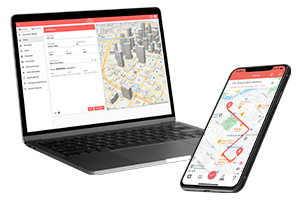Last updated on: January 3, 2023
Have you ever wondered what information the IRS is looking for when conducting an IRS Audit (e.g. for Mileage)? The IRS can track down your Business expenses and reconstruct your Daily Route from Parking fees, Tolls, or Vehicle inspection reports.
Imagine that you are being Audited for Mileage by the IRS. You quickly reconstruct a semi-accurate yearly Mileage log from memory and then turn in the papers for further inspection.
The IRS will check your previously submitted Tax Returns. They will find a previously claimed Business expense deduction for a Business lunch and a Business Mileage deduction claim for the trip to said lunch. The IRS will then check your related vehicle information.
Your Mileage log states that you were at a Business lunch that day. So far so good. Then, the IRS will find a vehicle inspection record, that states your vehicle was at the Mechanic at the time of the business lunch.
When the IRS finds contradictions surely a Fine will be issued.
It is better to know what information the IRS can have access to BEFORE you sit down and try to reconstruct your Mileage logs. Let’s review them.

Your Vehicle Records
IRS computers are connected to all other government (Federal and State) systems, which means they have access to DMV (Department of Motor Vehicles) records. Odometer readings recorded at the Mechanic or during Vehicle Safety Inspections, Traffic cams, Tolls, and Fees are all accessible to IRS Employees. You have to make sure that the data matches the locations in your mileage logs.
For example, if you had a parking fee on January 2, 2023, somewhere around the southern region of your hometown, make sure your Mileage log contains a trip close to that location.
Employee records
During the year, your company makes quarterly payroll tax payments with additional information and files a W-2 at the end of the year. Your personal details (Name, Age, Birth Date, etc), Contact details, Employment details (Employee Identification Code, Employment type, Employment status, work week, last day of work), Job details, and Payroll records are all accessible to the IRS.
If you received Carpe Diem, Mileage Allowance, or you were sent on a Business trip, the IRS will have access to that information.
Accounts and Amounts
When you receive more than $10 of interest in a bank account during the year, the bank has to report that interest to the IRS. If you have Investment Accounts, the IRS can see them in dividend and stock sales reportings through Forms 1099-DIV and 1099-B. If you get paid through a Merchant Account (like PayPal or VISA) and have enough transactions, the IRS will see the amount of these transactions on Form 1099-K.
It is essential to understand that average taxpayers and business providers alike have a reporting obligation to the IRS. If they cannot get certain information from you, they will turn to a service provider you had business with.
Wisest solution: Prevent contradiction in your mileage log
Use Mileage Logging Software with smart technologies such as:
- An AI-based AI Wizard feature that gives you Recommendations for your forgotten trips.
- A Built-In IRS Auditor on Your Side that checks and corrects a total of 70 Logical Conflicts to ensure your Mileage log is IRS-proof!
These functions are real lifesavers when Retrospectively Reconstructing your Mileage logs, as the software can complete even hopelessly deficient Mileage logs quickly, meeting Every Expectation.
If you would like to comply with the IRS try MileageWise without obligation! The trial period is 14 days with access to all of its features. You don’t even have to use your credit card.




